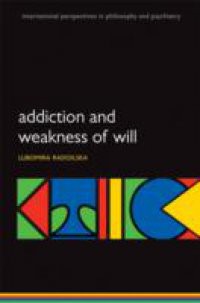The way in which society views addiction underlies how it treats, understands, blames, or even punishes those with addictive behaviours. This thought-provoking new book presents an original philosophical analysis bringing together addiction and weakness of will. Within the book, the author develops an integrated account of these two phenomena, rooted in a classical conception of akrasia as valuing without intending and at the same time intending without valuing. This fascinating and suggestive account addresses a number of paradoxes faced by current thinking about addiction and weakness of will, in particular the significance ofcontrol and intention for responsible action.Addiction and Weakness of Will makes an original contribution to central issues in moral psychology and philosophy of action, including the relationship between responsibility and intentional agency, and the nature and scope of moral appraisal. The book is valuable for philosophers, ethicists and psychiatrists with an interest in philosophy.

